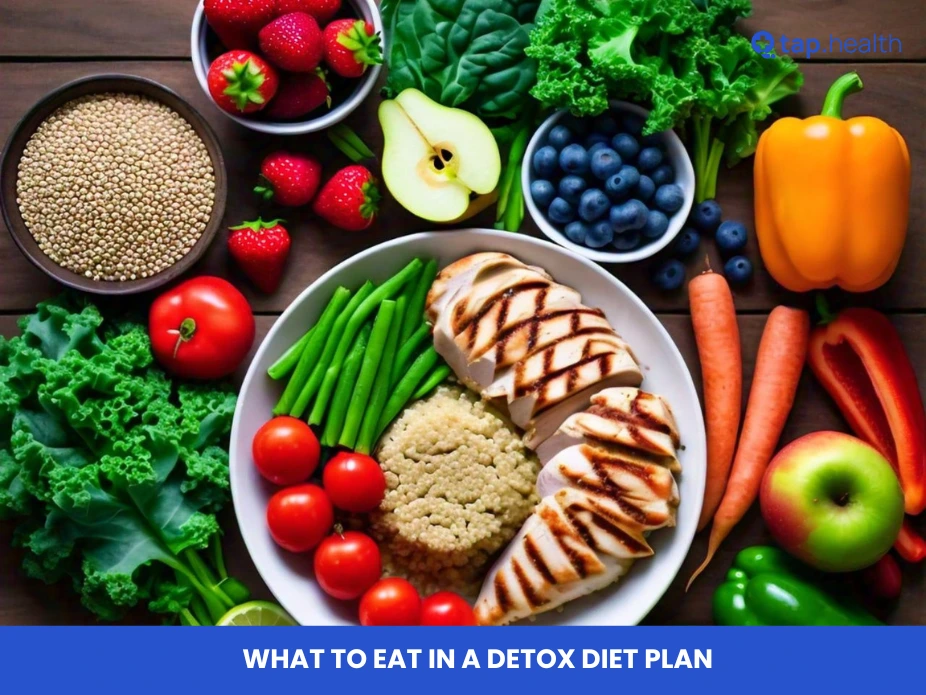Detox diets have become increasingly popular as people seek ways to cleanse their bodies and reset their health. With the abundance of processed foods, sugar, and environmental toxins we encounter daily, it’s no wonder that many are looking for a natural way to detoxify. But what should you eat in a detox diet plan to help your body eliminate toxins and feel refreshed? In this guide, we’ll break down what to eat, why it works, and how to get started with a simple, effective detox plan.
Understanding Detox Diets
A detox diet is essentially a way to support your body’s natural detoxification processes by focusing on nutrient-dense, anti-inflammatory, and hydrating foods. Our body already has its own built-in detox systems, primarily the liver, kidneys, and digestive tract. However, a detox diet helps to optimize these functions by providing the right nutrients and eliminating processed, inflammatory, or toxin-laden foods.
Detox diets can vary, but the general principles revolve around increasing the intake of whole, plant-based foods, drinking plenty of water, and avoiding foods that burden the body with excess sugar, unhealthy fats, or chemicals.
What to Eat in a Detox Diet Plan
Now, let’s dive into what foods should be included in your detox diet plan. These foods are packed with antioxidants, fiber, vitamins, and minerals that can help your body flush out toxins and promote overall health.
1. Water
Water is the most important component of any detox plan. Staying hydrated helps your body flush out toxins through the kidneys and promotes healthy digestion. Aim to drink at least 8 glasses (2 liters) of water per day, and consider adding lemon or cucumber to infuse additional detox benefits.
Why it works: Water helps with digestion, keeps your skin hydrated, and promotes kidney function, helping to flush out harmful substances from your system.
2. Fruits and Vegetables
Fruits and vegetables are packed with fiber, antioxidants, and vitamins that help the body detoxify naturally. Green leafy vegetables like kale, spinach, and arugula are particularly beneficial because they are rich in chlorophyll, which helps remove heavy metals and other toxins from the bloodstream. Cruciferous vegetables like broccoli, cabbage, and cauliflower also support liver detoxification processes.
Top choices for detox:
- Leafy greens: spinach, kale, arugula, collard greens
- Cruciferous vegetables: broccoli, cauliflower, Brussels sprouts
- Citrus fruits: oranges, grapefruits, lemons, limes
- Berries: blueberries, strawberries, raspberries
- Cucumbers: hydrating and full of antioxidants
Why they work: Fruits and vegetables are high in fiber, which supports healthy digestion and regular bowel movements, helping your body eliminate waste. They also contain vitamins, minerals, and antioxidants that neutralize free radicals, helping to reduce inflammation and promote liver health.
3. Herbal Teas
Herbal teas like dandelion root, ginger, and green tea can play an important role in detoxing. These teas are known for their ability to support digestion, reduce bloating, and help eliminate toxins.
- Dandelion root tea is excellent for liver health and can act as a mild diuretic, increasing urine production to help flush out toxins.
- Ginger tea can reduce inflammation and promote digestion, aiding the body’s natural detox process.
- Green tea contains antioxidants like catechins, which support liver function and help fight oxidative stress in the body.
Why they work: Herbal teas are rich in compounds that promote digestion, reduce inflammation, and support liver and kidney health, which are crucial for detoxification.
4. Whole Grains
Whole grains like quinoa, brown rice, oats, and barley are excellent sources of fiber, which helps to promote healthy digestion and regular bowel movements. Additionally, these grains help stabilize blood sugar levels, reducing cravings and providing sustained energy throughout the day.
Why they work: Whole grains are rich in fiber, which helps cleanse the digestive tract, while also providing energy and supporting a healthy metabolism.
5. Nuts and Seeds
Nuts and seeds are nutrient-dense and high in healthy fats, which can help balance hormones, reduce inflammation, and support liver detox. Some of the best nuts and seeds for detoxification include:
- Chia seeds and flaxseeds: Rich in omega-3 fatty acids and fiber, which support digestion and reduce inflammation.
- Walnuts: Contain antioxidants and omega-3s, which support liver health.
- Almonds: Full of fiber and vitamin E, which is important for skin health and detoxification.
Why they work: Nuts and seeds are full of healthy fats, protein, and fiber, which aid in digestion and provide essential nutrients to support detoxification.
6. Legumes and Beans
Beans, lentils, and other legumes are an excellent source of plant-based protein and fiber. They help keep you feeling full and support digestion by feeding the good bacteria in your gut. Some legumes, such as chickpeas and black beans, are also rich in antioxidants.
Why they work: Legumes are high in fiber, which helps to remove toxins from the digestive tract, while their protein content supports muscle repair and regeneration during a detox.
7. Healthy Fats
Incorporating healthy fats into your detox diet can help your body absorb fat-soluble vitamins and support the detoxification process. Healthy fats also promote satiety, helping to curb cravings and keep your energy stable throughout the day. Good sources include:
- Avocados: Full of monounsaturated fats and fiber, which support digestion and nutrient absorption.
- Coconut oil: Contains medium-chain triglycerides (MCTs) that can help boost metabolism and promote fat burning.
- Olive oil: Rich in antioxidants, which support the liver and digestive system.
Why they work: Healthy fats support the absorption of nutrients and help regulate blood sugar levels, while also providing energy and supporting overall detoxification.
8. Fermented Foods
Fermented foods like kimchi, sauerkraut, miso, and kombucha contain beneficial probiotics that promote gut health. A healthy gut is crucial for detoxification, as it helps your body eliminate waste efficiently.
Why they work: Fermented foods introduce healthy bacteria to the gut, improving digestion and enhancing the body’s natural detox process by supporting healthy bowel movements.
Real-Life Scenarios: Detox Success Stories
Scenario 1: Sarah’s 7-Day Detox Journey
Sarah had been feeling sluggish and bloated for months and decided to try a detox diet. She started her day with warm water with lemon and a smoothie made from spinach, chia seeds, and almond milk. For lunch, she had a quinoa salad with cucumbers, tomatoes, and olive oil. By the end of the week, Sarah felt more energetic, experienced less bloating, and had clearer skin.
Scenario 2: Tom’s Liver Cleanse
Tom was concerned about his liver health after years of eating processed foods and drinking alcohol. He began incorporating dandelion root tea, leafy greens, and a lot of hydrating fruits into his diet. He also avoided caffeine and sugar. After three weeks, Tom noticed a significant improvement in his digestion and energy levels, with his liver function tests showing improvement.
Expert Contributions: Insights from Nutritionists
Dr. Frank Lipman: Detoxification Expert
Dr. Frank Lipman, a renowned functional medicine doctor, believes that a well-planned detox diet can help the body release toxins, reduce inflammation, and support better digestion. He recommends starting with a clean, plant-based diet and staying hydrated. According to Dr. Lipman, avoiding processed foods and sugar is key for any detox to work effectively.
Dr. Michael Greger: Nutrition Specialist
Dr. Michael Greger, a medical doctor and nutrition expert, suggests that a detox diet should include plenty of fiber-rich plant foods. He emphasizes the importance of staying hydrated, eating fruits and vegetables, and incorporating healthy fats to support the body’s natural detox processes.
Recommendations Grounded in Proven Research
Studies have shown that eating a diet high in fruits and vegetables, drinking enough water, and reducing processed foods can lead to significant health improvements. For example, research published in the Journal of Clinical Medicine confirms that a diet rich in plant-based foods promotes the body’s ability to detoxify naturally.
Additionally, a study in the American Journal of Clinical Nutrition found that fiber-rich foods help regulate bowel movements, which is crucial for effective detoxification. Research also suggests that adequate hydration plays a key role in eliminating toxins from the body.
FAQ on What to Eat in a Detox Diet Plan
1. What foods should I avoid on a detox diet?
Avoid processed foods, sugary snacks, refined grains, caffeine, alcohol, and dairy. These foods can hinder your body’s natural detox processes.
2. Can I lose weight with a detox diet?
Yes, a detox diet can help you lose weight by eliminating excess water weight and reducing inflammation. However, for sustainable weight loss, a long-term healthy eating plan is needed.
3. How long should I follow a detox diet?
A detox diet can last anywhere from 3 to 7 days. For long-term benefits, consider adopting a plant-based, whole-foods diet as a lifestyle.
4. Can I drink coffee during a detox?
It’s best to avoid caffeine during a detox, as it can dehydrate your body and interfere with the detox process. Opt for herbal teas instead.
References
- Harvard T.H. Chan School of Public Health. “The Nutrition Source: Vegetables and Fruits.” Harvard Nutrition.
- National Institute of Environmental Health Sciences. “How the Liver Detoxifies.” NIEHS.
- Journal of Clinical Medicine. “The Role of Diet in Detoxification.” Journal Article.




